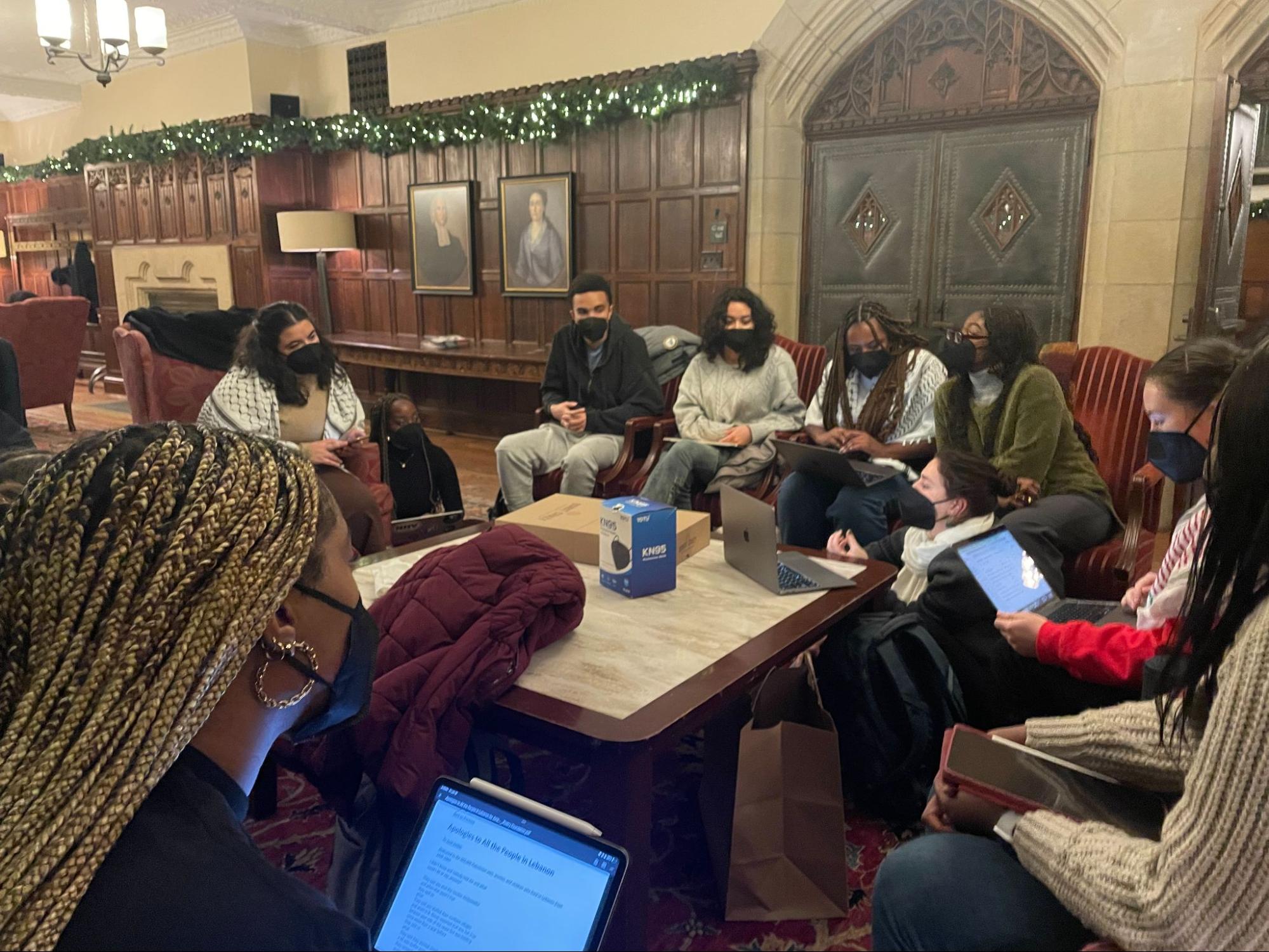Students attend “Reading Week for Gaza”
Students gathered each night last week to read excerpts from texts relating to colonialism, occupation, apartheid, genocide and censorship.

Nora Moses, Contributing Photographer
Last week, the Yale Liberation Coalition organized a “Week of Reading for Palestine” where students read a collection of texts related to a chosen nightly topic.
According to their Instagram bio, the Yale Liberation Coalition is a student group focused on “working towards the liberation of all oppressed peoples.” The five topics of this event, which took place every night from Monday, Jan. 15 to Friday, Jan. 19, were colonialism, occupation, apartheid, genocide and censorship.
The event was first announced via a joint Instagram post by the Yale Liberation Coalition, Yalies4Palestine and Mecha de Yale. Readings took place in a series of residential college common rooms at 5:30 p.m. each night. On Friday, Jan. 19, 16 people came to the reading, at which masks were encouraged.
“The genocide that’s occurring in Gaza has awakened a lot of people’s eyes to not only what’s been happening in the Middle East, in Palestine, but also to other contemporary and historical struggles such as those in the Congo, in Sudan, Puerto Rico, Hawai’i — struggles in which oppressed peoples have been fighting their colonizers, their oppressive regimes for freedom,” said Angel Nwadibia ’24, one of the organizers of the event. “We wanted this week to be an intersectional gathering of different campus affinity and activist groups as well as different publications in which we come together to discuss not only what’s happening in Gaza, but also to begin to draw the connections between different oppressed people of the world.”
Nwadibia was referring to Israel’s ongoing military offensive in Gaza. On Oct. 7, Hamas launched a surprise attack against Israel, killing 1,200 people and taking 253 people as hostages, according to Israel’s Foreign Ministry; Israel responded with a formal declaration of war and a full bombardment of Gaza. As of Jan. 21, the date of the most recent estimate according to Palestinian health officials, Israel has killed 25,105 Palestinians in Gaza — more than 1 percent of Gaza’s pre-war population.
On Friday, one student reading was the poem “If I Must Die” by Refaat Alareer. This poem circulated widely online and in the news in December when the well-known poet and professor was killed in an Israeli air strike.
Throughout the week, readings for the event also included the poem “My City’s Ceiling Is Too Tight” by Hala Shurouf, “Automating Banishment: The Surveillance and Policing of Looted Land” by the Stop LAPD Spying Coalition, an article on genocide published by the Martin Luther King, Jr. Foundation and the recent International Court of Justice Brief from South Africa when the country accused Israel of committing genocide in the Gaza strip.
The link to the complete list of readings, as well as PDF files, can be found in the bio of the Yale Liberation Coalition’s Instagram page.
At the beginning of the event, a student organizer asked that attendees not applaud at the end of each reading.
“We ask that this is a space of study, not performance,” she explained.
Some student attendees were drawn to the event not just to learn more about the issues but also for the sense of community that the space offered.
One such attendee was Zada Brown ’24, who noted she appreciated the togetherness and dialogue the event provided.
“I was curious about the group. I have definitely been reading a lot of news, trying to educate myself, but it’s nice to have a space to do that with other people. I came for the community, I guess, and to hear what other people are thinking about and talking about,” said Brown who attended successive days of the event. “It’s part educational, but also an affinity space for some people.”
The event on Friday took place in the Jonathan Edwards College common room.







